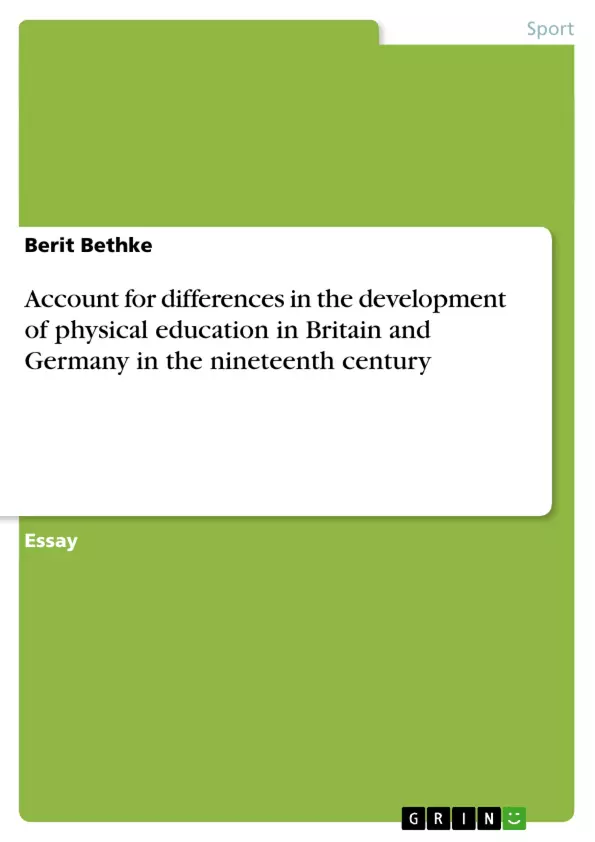...Comparing the physical educational concepts of Germany and Britain, this paper examines the development of physical culture in the nineteenth century. The compatibility of ROUSSEAU’s quotation to both notions assumes that there might be a common ground for each physical education approach. Enormous social, economical and political development affected whole Europe according to the Enlightment and influenced the physical culture – but in different nations to a different extent. Hence, I focus on the differences in the development of physical education...
Inhaltsverzeichnis (Table of Contents)
- The development of Turnen in Germany
- The development of Turnvereine
- The implementation of Turnen as a school subject
Zielsetzung und Themenschwerpunkte (Objectives and Key Themes)
This paper compares the development of physical education in 19th-century Britain and Germany, focusing on the differences in their approaches. It examines the influence of social, economic, and political factors on the shaping of physical culture in each country.
- The impact of Rousseau's philosophy on physical education
- The role of the Turner movement in Germany
- The influence of public schools in Britain
- The contrasting ideologies underlying physical education in both countries
- The development of institutions for physical education (Turnvereine in Germany, public schools in Britain)
Zusammenfassung der Kapitel (Chapter Summaries)
The paper begins by establishing the context of the rise of physical education in 19th-century Europe, referencing Rousseau's influence. It then focuses on the development of Turnen in Germany, highlighting the contributions of Gutsmuths and Jahn, and the connection between Turnen and German nationalism. The chapter discusses the military aspects of early Turnen and its subsequent suppression and revival. The role of Turnvereine (gymnastics associations) in shaping German physical culture is also explored. The text then introduces the contrasting development of modern sport in Britain, emphasizing the role of public schools and the commercialization of athletic competition. (Note: Summaries of the conclusion and final chapters are excluded to avoid spoilers.)
Schlüsselwörter (Keywords)
Physical education, Turnen, Turner movement, German nationalism, British sport, public schools, Gutsmuths, Jahn, Victorian Era, national identity, masculinity, physical culture, social and political influences.
Frequently Asked Questions
What are the main differences between 19th-century German and British physical education?
Germany focused on "Turnen" (gymnastics) linked to nationalism and military discipline, while Britain developed modern sports through public schools focusing on competition and character building.
Who was Friedrich Ludwig Jahn?
Known as the "Turnvater," Jahn was the father of German gymnastics and used physical training as a tool to promote German national identity and unity.
What role did British public schools play in sports history?
They were the breeding ground for modern organized sports, codifying rules for games like football and rugby to instill discipline and "muscular Christianity."
How did Rousseau influence physical education?
Rousseau’s emphasis on natural education and the importance of physical health for mental development provided the philosophical foundation for both German and British approaches.
What were the "Turnvereine" in Germany?
They were gymnastics associations that served as both athletic clubs and political hubs for the German national movement in the 19th century.
- Citation du texte
- M.A. Berit Bethke (Auteur), 2004, Account for differences in the development of physical education in Britain and Germany in the nineteenth century, Munich, GRIN Verlag, https://www.grin.com/document/119213



